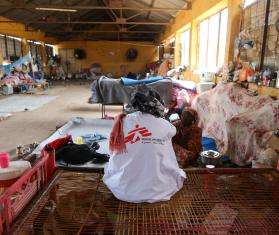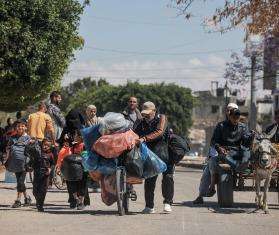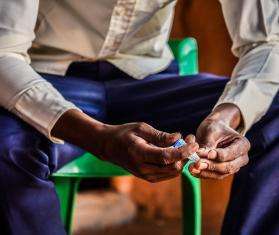Wider access to this medicine could help avoid millions of new HIV infections
NEW YORK/MONTREAL, JULY 28, 2022—Governments in low- and middle-income countries (LMICs) must urgently include long-acting injectable cabotegravir (CAB-LA) for HIV prevention in national HIV guidelines and accelerate its rollout, said Doctors Without Borders/Médecins Sans Frontières (MSF) today. MSF’s call for increased access to this drug comes as the World Health Organization (WHO) today recommended CAB-LA for HIV prevention, and the Medicines Patent Pool (MPP) and ViiV Healthcare announced an agreement to open up generic production and supply of the injectable in 90 countries.
CAB-LA—the first long-acting injectable approved for the prevention of HIV infection by the US Food and Drug Administration (FDA) in December 2021—is the most effective form of pre-exposure prophylaxis (PrEP) for people at high risk of HIV. Increasing access to this medicine could be a game-changer for people across the world as it only needs to be taken once every two months instead of daily, making it easier for people to adhere to and protect themselves against HIV.
However, as detailed in a new MSF report released ahead of the 2022 International AIDS Conference, the lack of transparency around the pricing and plans for registration of the drug and conditions for procurement, set by ViiV, may still pose barriers to accessing this medicine, particularly for people in LMICs.
“WHO’s recommendation for use of long-acting injectable cabotegravir offers a more effective option for people in countries like Mozambique, where there is a high prevalence of HIV, who would hugely benefit from rollout of this drug to help reduce new infections,” said Dr. Zaid Seni, MSF medical activity manager in Mozambique. “While the current oral preventive treatment available in low- and middle-income countries is effective, taking a daily pill can be challenging for some. CAB-LA offers a more discreet option that can facilitate better adherence for people at risk of HIV infection. We urge ViiV to make the drug available at an affordable price to support timely use of this game-changing drug to help avoid millions of new HIV infections.”
Today, at the 2022 International AIDS Conference, ViiV and MPP announced a limited and disappointing voluntary license on CAB-LA. A voluntary license is when a company or patent holder allows specific companies to produce generic versions of a medicine under specific conditions and restrictions.
“Today’s announcement of ViiV’s agreement with MPP is a welcome yet limited step given its restrictive geographical scope,” said Leena Menghaney, South Asia head of MSF’s Access Campaign. “The license allows only up to three generic companies globally to produce and supply. It is disappointing to note that a number of developing countries with generic manufacturing capacities in Latin America and Asia are currently excluded from this licensing agreement.”
ViiV currently charges $3,700 per vial in the US ($22,200 per person per year), despite research from the Clinton Health Access Initiative showing that generic manufacturers could produce this drug for around $2.60 per vial (less than $20 per person per year). Although ViiV has publicly said they would provide CAB-LA at their at-cost price in many LMICs, they have yet to announce that price.
Additionally, ViiV holds patents on CAB-LA in multiple developing countries, which can block access to more affordable generic formulations from being made and allow ViiV to sell CAB-LA at high prices. This monopoly could keep the medicine out of reach for many who need it unless licenses are issued to generic manufacturers.
“Following WHO’s recommendation for the use of CAB-LA as PrEP, ViiV must take immediate steps to publicly announce the price for this drug for all low- and middle-income countries and ensure sufficient supply everywhere by allowing procurement without any conditions to treatment providers and countries until generics are available,” said Jessica Burry, HIV/HCV pharmacist at MSF’s Access Campaign.




